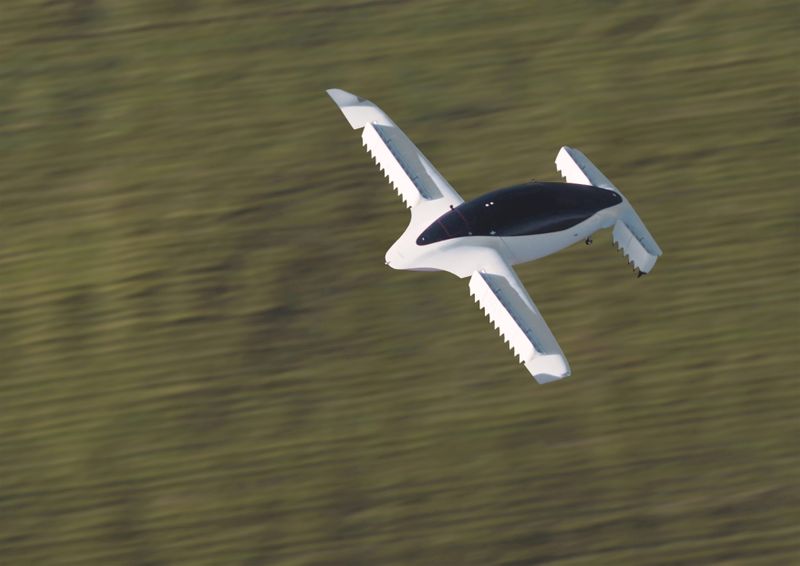 © Reuters. FILE PHOTO: A picture from Munich flying taxi startup Lilium shows its five-seater prototype in Munich, Germany, October, 2019. Lilium/Handout via REUTERS
© Reuters. FILE PHOTO: A picture from Munich flying taxi startup Lilium shows its five-seater prototype in Munich, Germany, October, 2019. Lilium/Handout via REUTERS By Tim Hepher
PARIS (Reuters) – Airbus and Boeing (NYSE:) watch out – one of the world’s largest aircraft owners says passenger planes could see their wings clipped by the rapid spread of flying taxi startups.
Commercial air travel already faces competition from high-speed trains in parts of the world. But the head of Irish aircraft leasing firm Avolon said competition would shift skywards as it invested up to $2 billion in aerial shuttles.
Avolon is among the launch customers for up to 1,000 electric Vertical Take-Off and Landing (eVOTL) aircraft being developed by Britain’s Vertical Aerospace, which plans to go public through a merger with a blank-check firm.
German air shuttle startup Lilium said in March it would float on the U.S. stock market via a similar process.
The deals reflect growing interest in battery-powered aircraft that can take off and land vertically, offering a new way for travellers to beat traffic and hop between cities.
Vertical’s VA-X4 has a range of 120 miles but that could be extended further, Avolon Chief Executive Domhnal Slattery said on late Thursday.
“The challenge for incumbent (planemakers) is if the range can extend to 400-500 miles, what is the implication for traditional narrowbodies?” he said in a Reuters interview.
Asked if the vehicles for four passengers and a pilot could take business from much larger commercial planes, Slattery said, “Eventually, yes of course. This is the inevitable future.”
Planemakers have themselves invested in such projects.
PARTNERSHIPS
Helicopter travel could also be squeezed.
“You have got to think that you have these machines that can disintermediate the legacy helicopters through just being 100 times quieter and no emissions,” Slattery said.
Avolon has placed a firm order for 310 eVTOLs worth $1.25 billion and 190 options worth $750 million, Slattery said.
They will join an owned or managed fleet of 568 passenger aircraft all the way up to the 396-seat Boeing 777-300ER.
Slattery said Avolon had not decided how to deploy the air taxis, whose relatively short product development cycles mark a shift for leasing companies used to long-term jet investments.
“We could partner with airlines, we could establish our own entities in different jurisdictions around the world, we could partner with helicopter operators,” Slattery said.
“I think it is going to take a lot of different forms over time. But the technology is here and we are going to lead commercialisation of it with zero-emission credentials”.
The move comes at a time when aviation companies are jostling for leadership of the environmental agenda as they came under pressure from investors to help decarbonise flying and bolster their environmental, social and governance (ESG) scores.
Vertical Aerospace says eVTOL aircraft can help the industry meet carbon reduction goals through zero emissions and electrical power, where possible derived from renewable energy.
But experts say questions remain over the timing of safety certification, which eVOTL suppliers expect as early as 2024.
Fusion Media or anyone involved with Fusion Media will not accept any liability for loss or damage as a result of reliance on the information including data, quotes, charts and buy/sell signals contained within this website. Please be fully informed regarding the risks and costs associated with trading the financial markets, it is one of the riskiest investment forms possible.

